The UConn Health MD/PhD Program would like to congratulate Rachel Cohn for winning a prestigious Ruth L. Kirschstein Nation Research Service Award (F30) from the National Institute on Aging. Rachel’s project is titled “Investigating Cellular Senescence at the Single Cell Level”. Rachel’s project builds upon her expertise in single cell RNA sequencing and the biology of aging. We are proud of her continued achievement here at UConn Health.
MD/PhD
MD/PhD Student Jennifer Chung Wins F30 to Study Human Microbiome
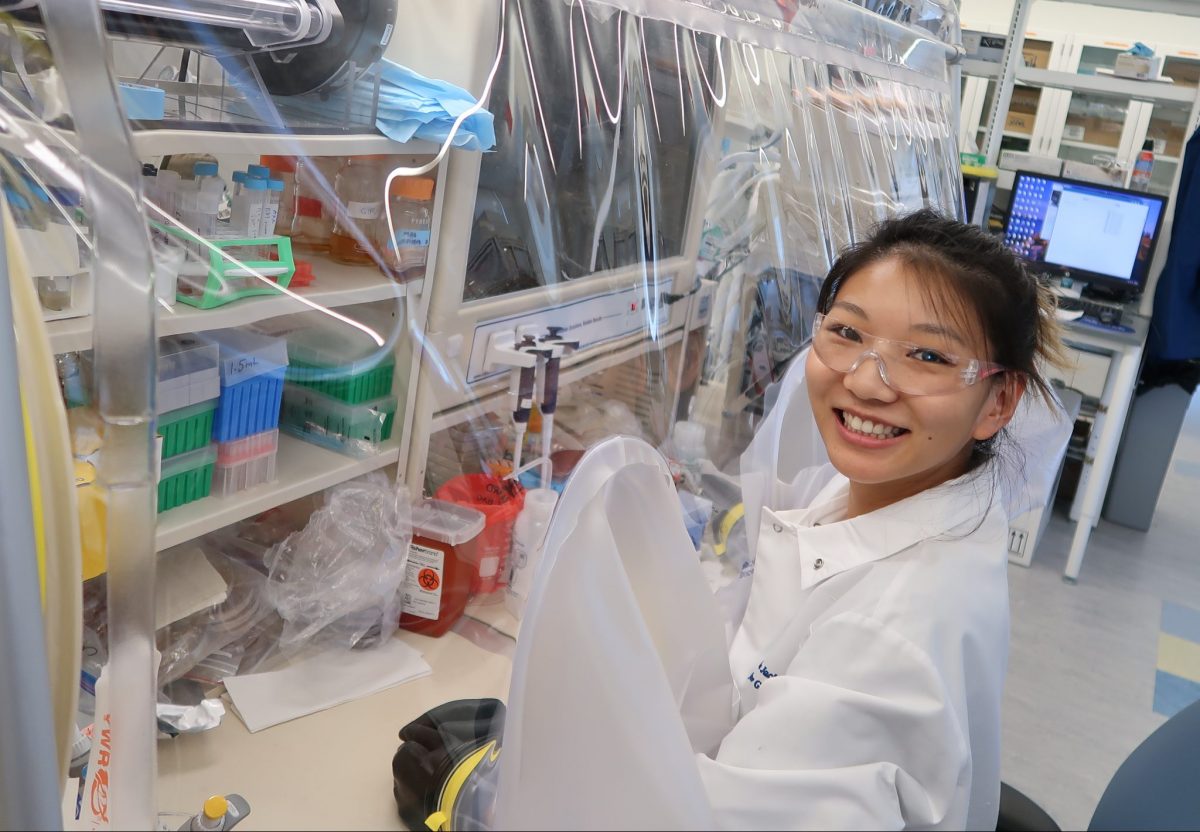
We would like to congratulate Jennifer Chung for winning a prestigious F30 award funded by the National Cancer Institute. Her project “Uncovering interactions of the gut microbiome with the immune system in the context of immune checkpoint inhibitors” presents an interdisciplinary approach to cancer biology that complements her efforts in the departments of genetics and immunology. In the lab, Jenn has been working to unravel the complex roles that the human microbiome plays in both health and disease. In particular, she is aiming to use this grant opportunity to investigate why cutting edge immune checkpoint inhibitor therapies seem to fail in many cancer patients and how gut microbes may dictate these variable response rates. Furthermore, she hopes that this funding opportunity will lay the foundations for her future career as a cancer specialist in the field of dermatology.
Jenn is currently in her 6th year with the program. Outside of her dedicated work in both lab and clinic she enjoys cooking gourmet foods, traveling, and recently began playing the guitar. Jenn would like to thank Maria Xu, Joe Ryan, Michael Chung, Grace Kwon, and Allie Goetjen as well as the greater MD/PhD community at UConn Health for the advice and support she received in applying for this award.
MD PhD Students Win American Heart Association Fellowships
The UConn MD/PhD program would like to congratulate Kristin Tokarski and Feria Ladha for winning prestigious predoctoral fellowship grants from the American Heart Association.
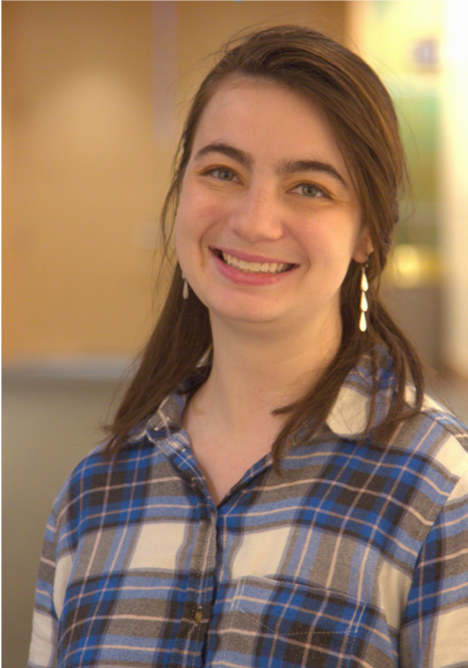
Kristin is in her 3rd year of graduate training in the department of cell biology. As a member of Dr. Kimberly Dodge’s lab she is studying the potential role of A-Kinase Anchoring Proteins (mAKAPs) in the regulation of cardiomyocyte apoptosis. Her experiments seek to offer insight regarding the role of these proteins in cardiac cell death associated with myocardial infarction and pharmacologic cardiotoxicity. Kristin is excited about her award and how it can help her achieve her goal of serving pediatric populations as a cardiovascular clinical geneticist. Speaking with Kristin, she mentioned that she “dreams of being at the forefront of advancing medicine” and that this grant is “very rewarding and shows me that I can do it”. Kristin would also like to thank her mentor Dr. Dodge for the support she provided to bring the grant to fruition.
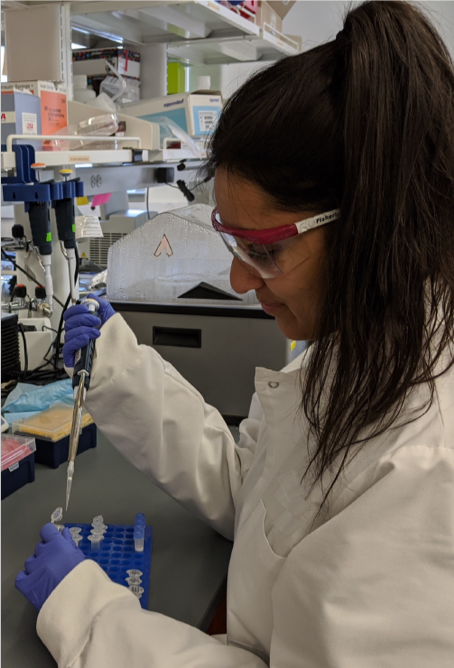
Feria is in her 3rd year of the graduate phase in the department of Genetics and Developmental Biology. As a member of Dr. Travis Hinson’s laboratory she is working to elucidate the role of novel RNA binding proteins in cardiomyocytes. Her grant “Understanding the role of RNA binding proteins identified at the cardiac sarcomere using bio ID proximity labeling” seeks to use highly specific bio-tagging techniques to explore the potential roles of these proteins in cardiac metabolism. Feria aims to use her training to pursue a career as a pediatric physician scientist with a particular emphasis on mitochondrial disease processes. Feria would like to thank her PI Dr. Hinson as well as Dr. Brenton Graveley for their guidance in the grant application process.
MD/PhD Student Spotlight: Gianluca Arianna, G2
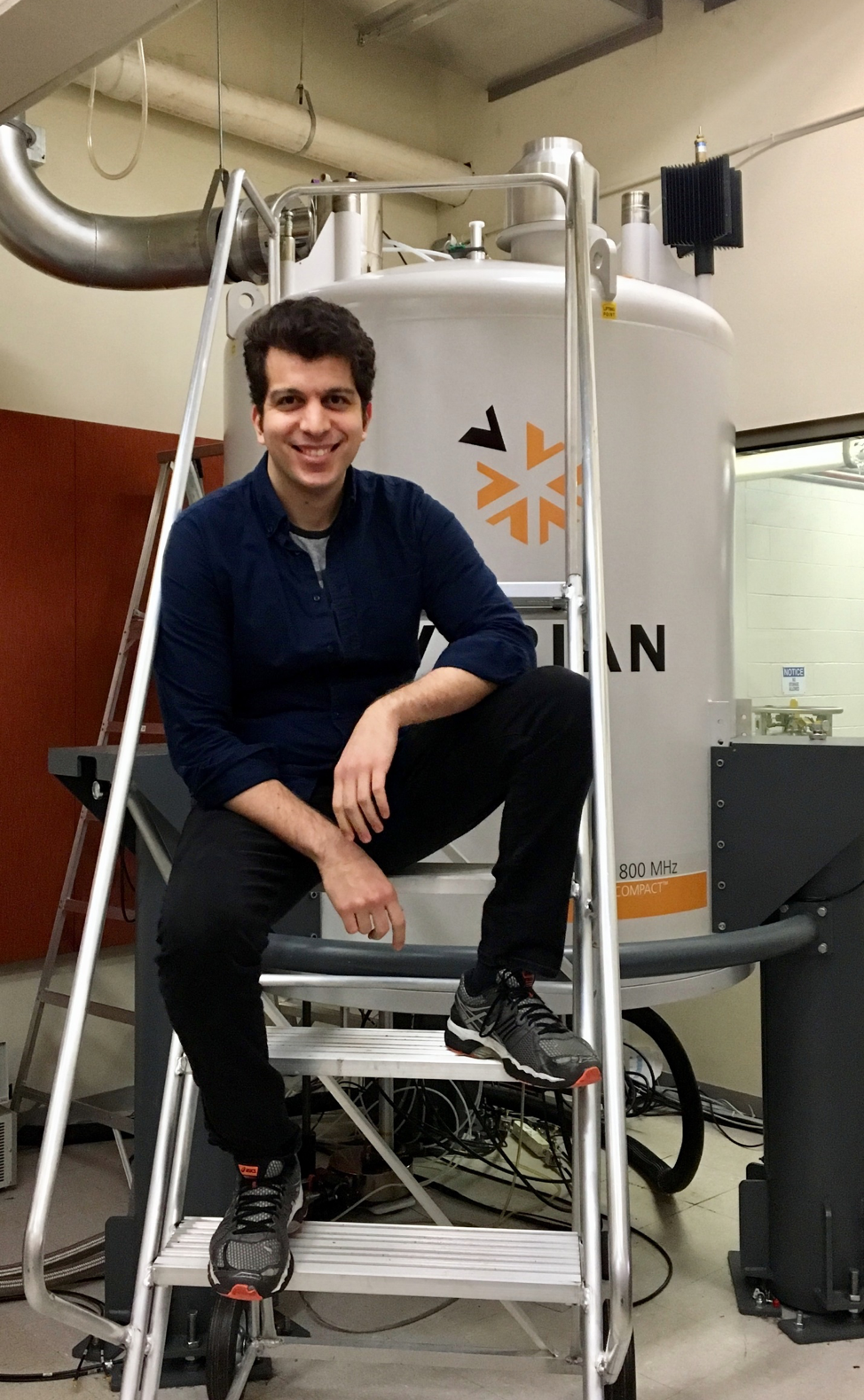
MD/PhD Spotlight Series by Nathan Gasek
Welcome to the UConn Health MD/PhD student spotlight! Our program abounds with exciting achievements and even more exciting people. This week, I had a chance to talk with Gianluca Arianna, a G2 student in the Department of Molecular Biology and Biochemistry (MBB). Gianluca’s research in Dmitry Korzhnev’s lab uses a structural biology approach to investigate how cells replicate in the context of DNA damage. Specifically, he is researching DNA damage tolerance pathways, which are implicated in tumorigenesis and may provide key insights to future chemotherapeutics. He became involved in this research as it appealed to both his chemistry background and his medical interest in cancer therapy. The MBB program was particularly appealing to him as it provided “a strong sense of family.” With regard to his research, he is particularly thrilled to have written the specific aims for his preliminary exam, mentioning that “it’s exciting to have something from your own mind come to fruition [which is] the reason why I enjoy science so much in the first place. There’s so much creative control over your experience.”
In addition to his graduate work, Gianluca is maintaining his medical chops through the Clinical Longitudinal Immersion in the Community (CLiC) program and shadowing UCHC providers. With CLiC he is able to hone his clinical skills at an internal medicine clinic throughout his graduate phase. Outside of school he enjoys playing piano, learning guitar, and has recently taken up an interest in archery.
For future applicants, he voiced that “There is a lot of opportunity here. [From] clinical experiences to education opportunities, faculty are approachable for anything from research and shadowing to curriculum design.” When asked about his favorite aspect of UConn’s MD/PhD program, Gianluca pointed to the collaboration, support, and camaraderie. From the program directors to fellow students, he notes that “Your success is important to your peers”.
At the end of our talk he also offered advice to student’s in the earlier phases of the program. “You need to approach your career with some degree of planning and some degree of risk. Have an action plan, but realize that you’ll always learn something new. You’ll end up in new situations you might not have anticipated in the first place [but] don’t take things too seriously and enjoy your experience.”
MD/PhD Alum Returns to Discuss Physician Scientist Training and Career
UConn MD/PhD Class of 2013 alumnus Eric Gaier and Ophthalmologist at Harvard Medical School returned to give Alumni rounds at UConn’s weekly MD/PhD Research club. (Or “Nerd Club”, as he says it used to be called).
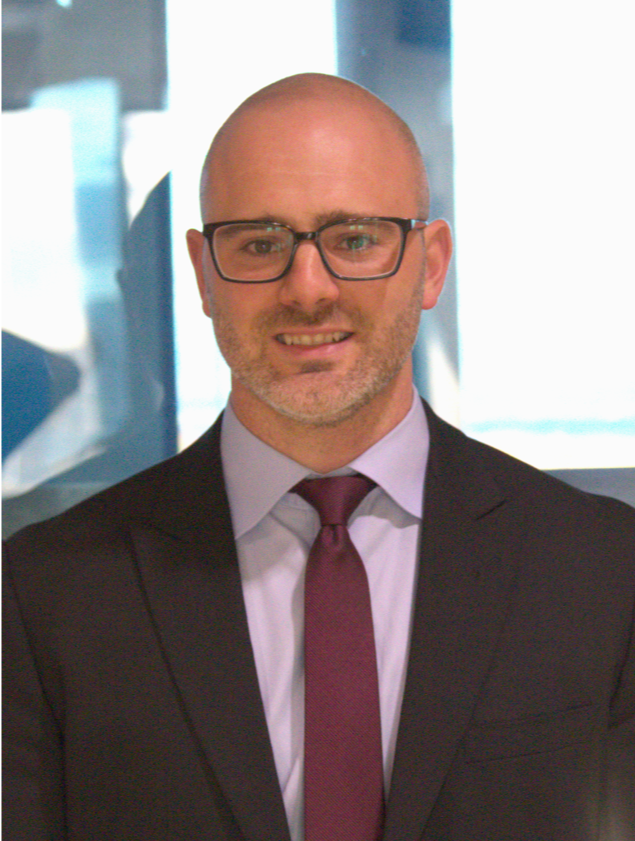
Following his graduation from UConn’s dual degree program, Dr. Gaier began his Ophthalmology residency at the preeminent Mass Eye and Ear through Harvard Medical School. With his training, he was able to secure highly competitive fellowships in both Neuro-Ophthalmology and Pediatric Ophthalmology/Adult Strabismus through Boston Children’s Hospital. Currently, Dr. Gaier complements his clinical work with NIH K08 funded basic and translational research investigating how principles of synaptic plasticity can be used to elucidate therapeutic strategies in the treatment of amblyopia. His research has led him to patent a novel approach and medical device for treating pediatric amblyopia and he currently serves as a scientific advisor with the company Luminopia. Beyond this, he engages in several teaching roles at Harvard Medical School spanning from resident education to undergraduate and graduate student research mentorship.
During his visit Dr. Gaier had lunch with current MD/PhD trainees, explored additions made to the program since his graduation, and gave a seminar reflecting on his own time in medical school. In discussion, he noted how his continuity clinic experience, now called “CLiC”, provided him with exposure, motivation, and training that set him on a successful career in Neuro-Ophthalmology. Furthermore, he highlighted the myriad of opportunities UConn’s physician scientist training program provided him, and urged every student to explore all that the institution has to offer.
Article by Nathan Gasek
MD/PhD Candidate Grace Kwon Advocates for Science on Capital Hill
This article is a republication of an article written by Jil Staszewski, Policy & Advocacy Manager, ASHG on the ASHG blog. You can view the original article here.
September 18-19 marked the 2019 Rally for Medical Research, hosted by the American Association for Cancer Research (AACR). Three hundred scientists, physicians, patients, and activists met with their elected officials on Capitol Hill, calling for an increase of at least $2.5 billion in NIH funding in Fiscal Year (FY) 2020.
Emily Davenport, PhD, of Pennsylvania; and Grace Kwon, BS, of Connecticut, both members of the Training & Development Committee, participated in this event, sharing their stories with seven congressional offices to make a case for this increase in funding.
ASHG: How was your overall first experience advocating on the Hill?

Grace Kwon: Participating in the Rally for Medical Research was a wonderful experience. It put into perspective the wide-ranging impact both basic and clinical research can have across the country, at an individual and community level.
The opportunity to directly advocate for increased NIH funding to Congressional offices was a unique experience that a graduate student might think wouldn’t have a large impact. However, as the only constituent from the state of Connecticut I was able to give personal examples of how NIH funding has made an impact on my training thus far. As a student, I was also able to directly speak about the impact that a sustained increase in NIH funding would have on my future career.
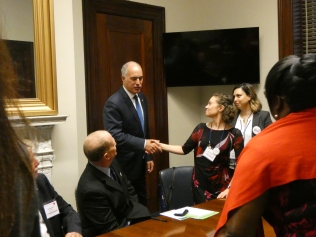
Emily Davenport: I had a great time advocating for NIH funding with the Rally for Medical Research. I was able to meet with elected officials and/or staff from both of the Senators and three of the representatives from my state, along with other researchers, patients, and advocates. Every conversation was different. The perspectives of everyone in the room emphasized the broad reach NIH funding has, including not only improving health, but for science careers, job creation, and education.
ASHG: Why is it important for scientists to meet with their members of Congress?
Emily: Science takes time and science careers can be unstable. As working scientists, we are all too aware of those facts, but they aren’t always clear to our representatives. It’s incredibly useful for members of Congress to meet with researchers to understand just how long it takes to go from having an idea, to securing funding, to performing the research, and then potentially translating that research into something clinically useful.
Having stable and predictable funding is the only way that can happen. Representatives see first-hand what their support is capable of generating by hearing examples of the research discoveries happening in their home districts.
Grace: The fact that the Rally for Medical Research brought a wide-ranging group of individuals is a testament to the impact that NIH funding has in the United States. Scientists bring one unique perspective that will help Congressional leaders understand how increasing NIH funding provides both short- and long-term benefits. Important innovations like cancer immunotherapies, genetic testing, and vaccines started in the laboratory.
There is also an underlying notion that science and research is inaccessible to the general public. This is false! Science is for and impacts everyone. It is a scientist’s responsibility to make their research understandable to those outside of the field and provide a broader context for their research focus.
ASHG: What are some ways your colleagues and fellow ASHG members can get involved in advocacy?
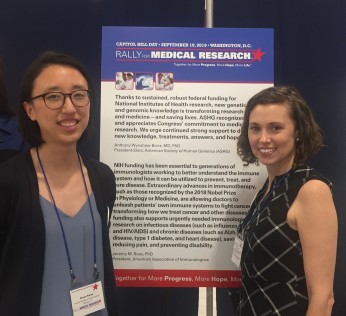
Grace: Reach out to your state’s Congressional leaders! ASHG has many opportunities listed on their webpage, where you can also send a letter to your state’s Senators. Institutions often have an office dedicated to working on legislation focused on science-related issues, such as research funding – I would reach out to them for any opportunities they have available. If you are a trainee or student, you can form a student group or organization focused on advocating for a specific cause if your institution does not already have one.
Emily: Advocacy comes in all shapes and sizes. You can do as little as take 10 minutes to call or email your representatives about an issue that’s important to you, or go as far as applying to do a policy fellowship to be directly involved on a daily basis. One great way to start getting involved is “taking the pledge” and becoming an ASHG Advocate. You’ll get monthly email updates with up-to-date action alerts, genetics policy news, and relevant policy-related events.
Original article can be viewed at the ASHG Blog here.
MD/PhD Candidates Katie Discipio and Grace Kwon win F30 Awards
The UConn MD/PhD Program would like to congratulate Katie Discipio and Grace Kwon on their receipt of F30 Fellowships from the NIH! Katie DiScipio (Advisor: Sandra Weller, PhD) and Grace Kwon (Advisor: Adam Williams, PhD) are both GS4 (6th-year total) students in the MD/PhD program.
Katie and Grace have recently been funded F30 Ruth L. Kirschstein National Research Service Awards (NRSA) from the NIH. F30 NRSA awards are competitive grants awarded by the NIH to enhance the research and clinical training of dual-degree MD/PhD students.
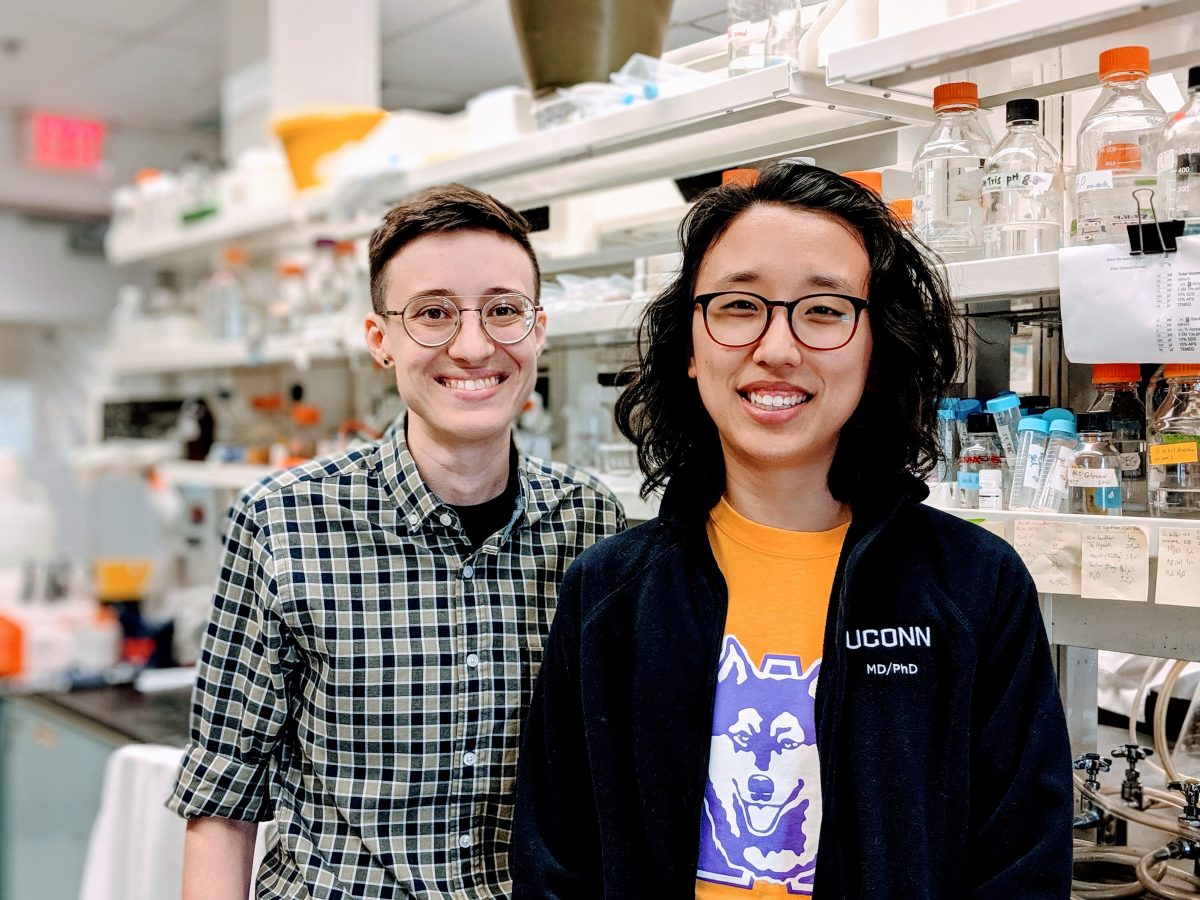
Katie DiScipio received F30 support from the National Institute of Allergy and Infectious Diseases (NIAID) for her project titled “Understanding the protein-protein interactions important for the initiation of HSV-1 DNA synthesis” Her doctoral research is focused on structure-function relationships of herpes simplex virus (HSV) and their role in contributing to HSV replication.
Grace Kwon received F30 support from the National Heart, Lung, and Blood Institute (NHLBI) for her project titled “Investigating the function of a highly expressed lncRNA in airway epithelium”. Her doctoral research is focused on the role of long noncoding RNAs in the pathophysiology of allergic asthma, specifically looking at bronchial epithelial cells.
We wish them the best of luck in the completion of their research endeavors. Congrats Katie and Grace!
MD/PhD Students Attend Colorado Physician-Scientist Conference
Three UConn Health MD/PhD students recently attended the 34th Annual MD/PhD National Student Conference at Copper Mountain, CO.
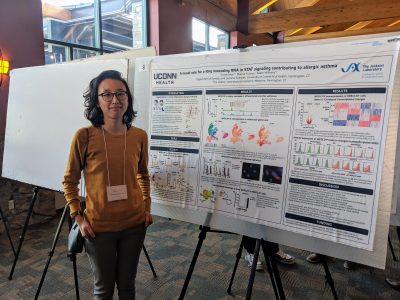
Each summer, the UConn Health MD/PhD program sends a group of students to the 3-day conference that is exclusive to dual-degree MD/PhD students. The conference features student presentations, career development workshops, and keynote seminars from distinguished speakers.
This year’s keynote speakers included Nobel prize winner Dr. Peter Agre from Johns Hopkins University, accomplished neuroscientist Dr. Huda Akil from the University of Michigan, Acting Director of the National Cancer Institute (NCI) Dr. Douglas Lowy, leading oncologist Dr. Padmanee Sharma from MD Anderson Cancer Center, and UConn Health’s own Dr. Cato Laurencin.
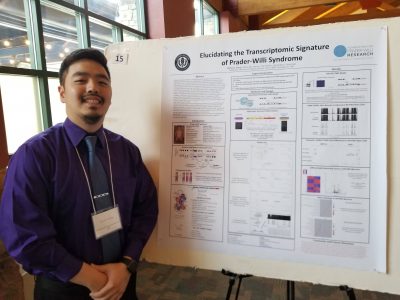
“Hearing from someone like Dr. Peter Agre was a great opportunity. Listening to his breadth of work on aquaporins was absorbing, but it was also inspiring to hear about all of the trainees Dr. Agre mentored – he told a story about each individual and their work. It’s not common for a speaker to consistently mention all the individuals that led to seminal discoveries, and it was clear he was just as proud of the trainees he’s mentored as much as the resulting scientific discoveries.” Said Michael Chung, a GS4 (6th-year total) student in the program.
Along with scientific keynotes, the conference hosted residency program directors from across the country to speak with MD/PhD students about research opportunities during post-graduate clinical training. In particular, questions were answered of physician scientist training programs (PSTPs), unique training programs designed for recent medical graduates who are interested in a physician-scientist career. Many MD/PhD students go on to match into these residency programs.
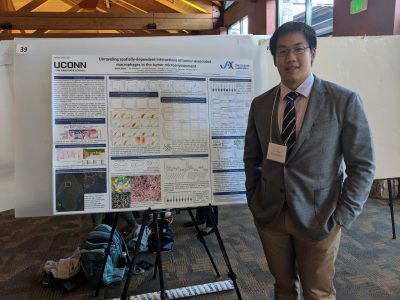
“I found the PSTP Residency Planning Showcase to be particularly valuable. It provided a unique opportunity to meet with programs I was interested in to better understand what the programs had to offer as well as the qualifications they were looking for in an applicant. It was a very useful planning tool to map out the remainder of my MD and PhD education, even if that process is still a way off.”, noted Victor Wang, a GS3 (5th-year total) student in the program.
The well-organized conference is a fantastic opportunity to meet other dual-degree students across the country, and also allowed for some time to enjoy the Colorado outdoors.
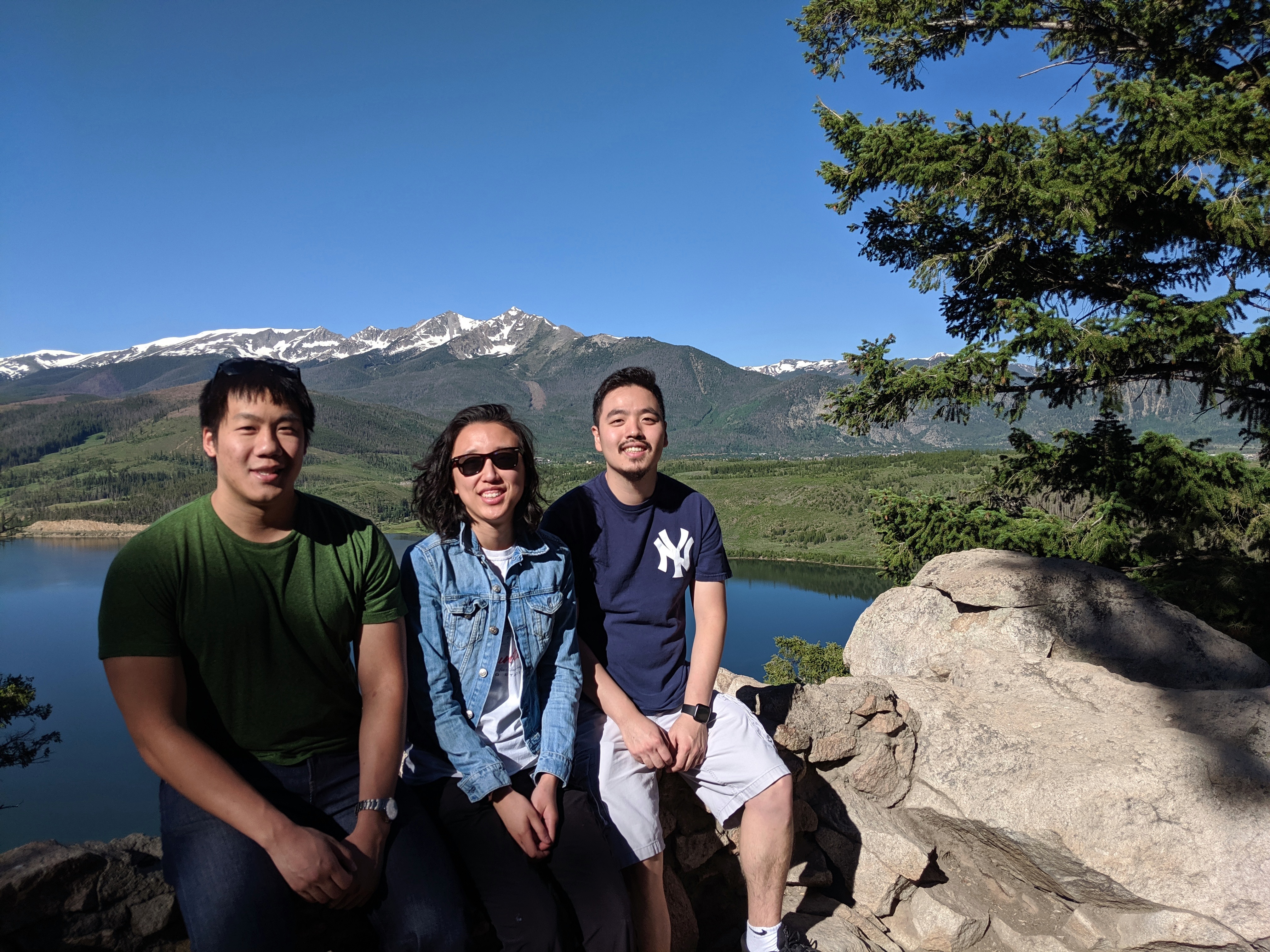
MD/PhD Candidate Allie Goetjen Wins F30 Award
The UConn MD/PhD Program would like (almost two years belatedly) to congratulate Alexandra “Allie” Goetjen, a 7th year student in the program, on her receipt of a F30 Pre-Doctoral Fellowship from the NIH.
Her grant, titled “GABRA2 genetic variants and chromosome conformation in induced pluripotent stem cell-derived neural cells” aims to advance our ability to understand and treat alcohol use disorder.
Here is a lay summary from the grant (we’re not all neurogenetecists):
Alcohol use disorder is a chronic neuropsychiatric disorder with limited treatment options currently available. High prevalence of this disorder in the U.S. population presents a significant financial, emotional, and physical burden on patients, their families, and society. Early detection of individuals at increased genetic risk for developing AUD could lead to more-individualized treatment options.
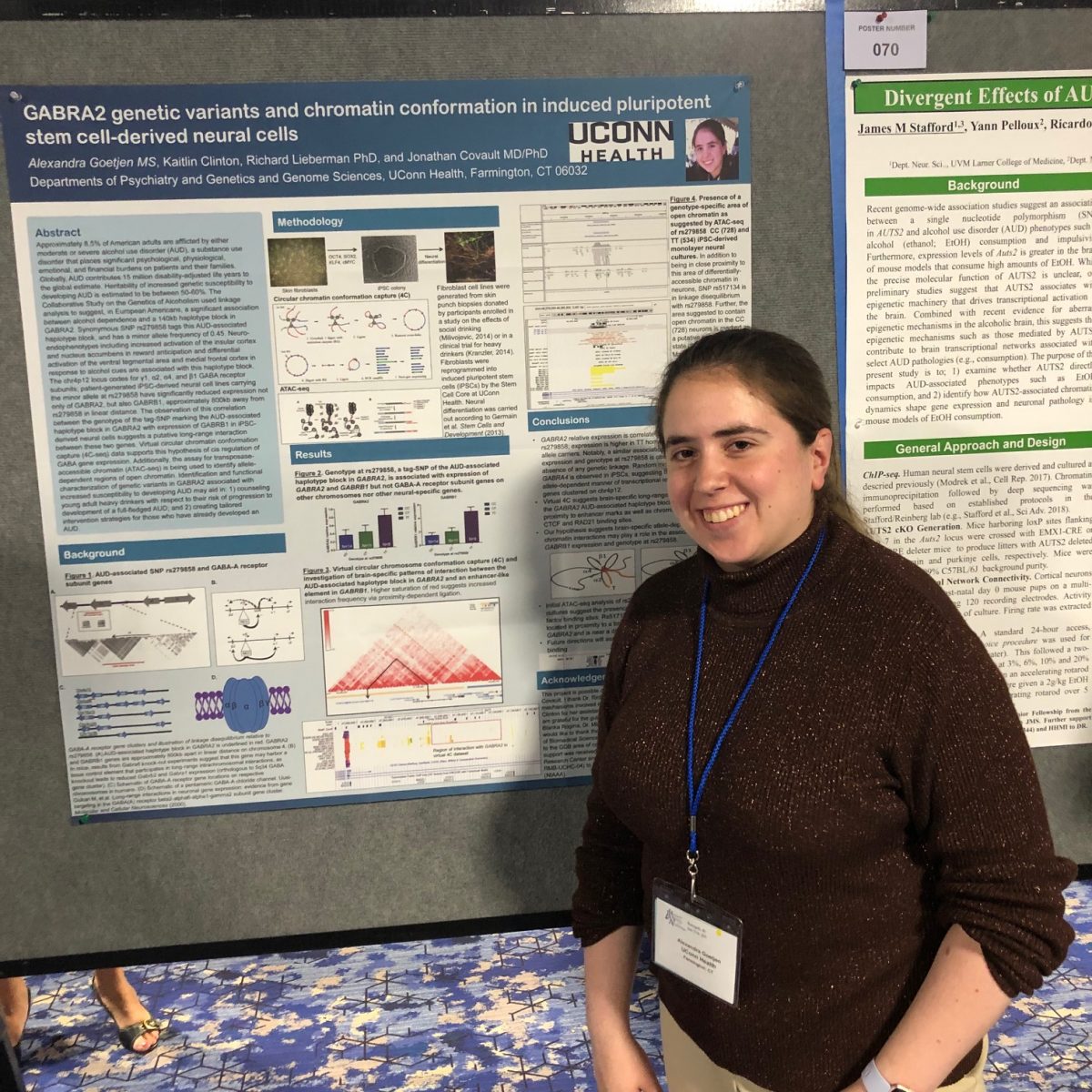
NIH F30s are highly competitive fellowships for MD/PhD students awarded on the merit of the research proposal, the candidate in question, their faculty mentor, and their institutional environment.
We asked Allie to comment on her accomplishment:
This project is possible due to the patience, kindness, and mentorship I have received from Dr. Jonathan Covault. In addition, the expertise of the members of my thesis committee is invaluable. I thank Drs. Richard Lieberman and Maegan Watson for pioneering the use of iPSC-derived neural cultures in the Covault laboratory for the study of genetic and epigenetic mechanisms associated with increased risk of developing AUD. I am grateful for Kaitlin Clinton’s tireless guidance and patience along the length of this project, during the many times I have had questions when trying new techniques, gotten physically lost while trying to find something in the building, or was in need of the support of a friend when an experiment did not work the way we had expected it to. I am humbled to have the opportunity to work with the Alcohol Research Center at UConn Health. Lastly, I am grateful for the challenges, people, and places I have encountered up to this point on my journey to obtaining my dual doctorate degrees, as each has shaped me into the person I am today, and will continue to shape me into a physician-scientist eager to join the fields of academic medicine, genetics, and addiction psychiatry.
This achievement comes after an upward struggle against serious personal hardships that just could not keep Allie down. As you can tell from her commentary, her personal strength, diligence, and perseverance are surpassed only by her humility. Allie will return to the clinic this year, and aims to pursue a career as an academic psychiatrist.
Congratulations, Allie!
MD/PhD Candidate Tony Pettinato Awarded AHA Fellowship
Congratulations to MD/PhD student Anthony “Tony” Pettinato, who has received the American Heart Association (AHA) Predoctoral Fellowship Award! Tony is doing his PhD research under the mentorship of Travis Hinson at JAX-GM.
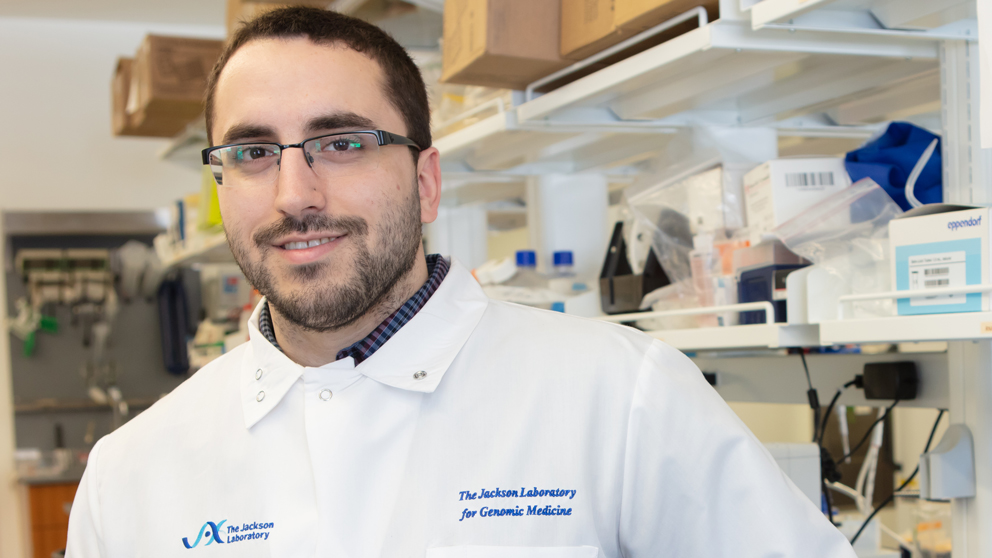
The purpose of this award is to “To enhance the integrated research and clinical training of promising students who are matriculated in predoctoral or clinical health professional degree training programs and who intend careers as scientists, physician-scientists or other clinician-scientists, or related careers aimed at improving global cardiovascular health.”
This AHA Fellowship Award will provide funding for two years of Tony’s research efforts, as well as additional financial support for travel and equipment.
His award was also featured by The Jackson Laboratory.
Congrats again to Tony!